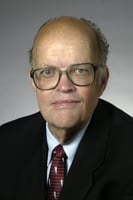You have /5 articles left.
Sign up for a free account or log in.

Jerry Hough
Duke University
For the last week, many in academe have been debating comments made on Twitter by Saida Grundy, a new faculty member at Boston University, in which she said, “Why is white america [sic] so reluctant to identify white college males as a problem population?” Amid the debate, some have speculated about what would happen if a white professor made generalizations about black students. Would such a person immediately lose his job, or would he suffer no more than some criticism?
It turns out that as Grundy was facing scrutiny, many students and academics at Duke University were finding and becoming appalled by comments posted to a New York Times discussion board by a Duke political science professor, Jerry Hough.
In response to a New York Times editorial about racism's lingering impact on Baltimore, Hough rejected the analysis. After talking about political trends regarding issues of urban poverty, he wrote: "I am a professor at Duke University. Every Asian student has a very simple old American first name that symbolizes their desire for integration. Virtually every black has a strange new name that symbolizes their lack of desire for integration. The amount of Asian-white dating is enormous and so surely will be the intermarriage. Black-white dating is almost nonexistent because of the ostracism by blacks of anyone who dates a white. It was appropriate that a Chinese design won the competition for the Martin Luther King state [sic]. King helped them overcome. The blacks followed Malcolm X.”
There are of course differences between the two faculty members. The Boston University faculty member is starting her career, and posted within the 140-character limit imposed by Twitter. The Duke professor is 80 years old, a long-time faculty member with an endowed chair who is headed toward retirement. He posted within the 300-word limit of the Times. But both made generalizations about types of students.
Many sociologists have argued that Grundy (within the limits of Twitter) was telling the uncomfortable truth. There have been few coming forward to defend Hough's name analysis or integration analysis. Hough is standing by his comments, and linked the university's criticism of them to its alleged political correctness.
Quite aside from the question of whether Duke faculty members should be judging the names of students of various backgrounds, a look at the rosters of the main organization for black students and the main organization for Asian students at Duke suggests that Hough's statements about "virtually every black student" and "every Asian student" are wrong. The executive committee of the black student group does include students with names that might not have been common at Duke 30 years ago, but also includes students with the first names Henry, Jessica, Chelsey, Justin and Broderick. While Anglo names are common on the roster of the Asian student group, one can also see students with the first names Jun Hong and Li-Chen.
Thus far, Hough has been treated in some ways similar to Grundy -- he has been criticized by the university, but his right to academic freedom has been defended.
Numerous comments on social media have called Hough a racist. On Twitter, the remarks included, "The unchecked racism of a tenured Duke professor" and "It would be naïve to think that Professor Hough is the only professor who feels this way."
Don Taylor, associate professor of public policy at Duke, blogged of Hough: "He is free to say what he wishes, and I defend this right. I think his words are racist; to me, the plain meaning of racist is believing you know everything about someone else, including their motives, based on the color of their skin. When he identifies himself as a professor (and social scientist), then it is reasonable to expect evidence to back up claims, which he does not provide. The more sweeping the claims ('Every Asian student'… 'Virtually every black'…) the more one should expect evidence, especially from a professor."
Taylor also noted that this has been a difficult semester for black students at Duke. An incident involving a noose on a tree shook the campus, and some minority students did not accept the university's explanation that the student who put it there (an international student) acted out of ignorance, not malice.
"This has been a very hard year at Duke for many black students," wrote Taylor. "I just want to say to our black students that I am sorry, and that I am glad that you are at Duke."
The university condemned Hough's statement, but defended his right to make it.
“The comments on the website were noxious, offensive and have no place in civil discourse," said a university statement. "Duke University has a deeply held commitment to inclusiveness grounded in respect for all, and we encourage our community to speak out when they feel that those ideals are challenged or undermined, as they were in this case. At the same time, as noted in the Faculty Handbook, every faculty member at Duke has a right 'to act and to speak in his or her capacity as a citizen without institutional censorship or discipline.' We take issues like this seriously and will use the opportunity to restate Duke’s core values of diversity and tolerance.”
Many on social media related the Hough controversy to the one involving Grundy. One typical comment on Twitter: "#JerryHough is a good example of why #ISupportSaida. This is EXACTLY what she was tweeting about."
One difference between the Hough and Grundy controversies is that she has expressed regret about her tweets, but in an email exchange with Inside Higher Ed, Hough defended his comment and criticized Duke for criticizing him.
Via email, he said he had supported Martin Luther King Jr. early in the civil rights movement and voted for President Obama, in both cases out of a belief that the United States needs to embrace equality and integration to advance opportunity for all people.
Hough said he is currently on a phased retirement plan (set up before the current controversy) and is on track to end his career at Duke in 2018 and to stop teaching in 2016. He said he was "very disappointed to be told that a university spokesman called my comments noxious and not part of civil discourse," but that he was perhaps not surprised since "Duke has, as everyone knows, been far more politically correct the last decade than most universities."








